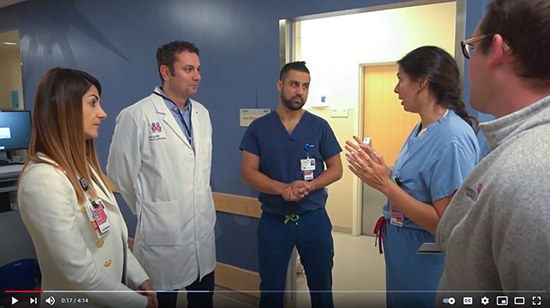New videos from the IU School of Medicine Department of Pediatrics focus on the commitment of faculty members to providing care, training and research in global health settings both internationally and in Indiana.
“With support from Dr. Bobbi Byrne, we created the videos to highlight the wonderful global work that our Department of Pediatrics faculty are involved with,” said Megan McHenry, MD. “These individuals work quietly and are not interested in receiving external praise. But we felt like it was our duty to bring attention to the great work they’re doing and show how our department is working towards addressing health inequities here in Indiana and around the world.”
The video series includes profiles of these IU School of Medicine faculty members and programs:
Terry Vik, MD, professor of pediatrics in the division of pediatric hematology/oncology, has been improving leukemia diagnosis and cancer care within the Academic Model Providing Access to Healthcare (AMPATH) partnership in Kenya where IU has had a partnership for more than 30 years. “It became fairly clear early on that the inability to make a diagnosis was paramount. Finding kids who had leukemia became a primary focus of my thought process,” said Dr. Vik. He has worked with AMPATH for over a decade and was awarded a Fulbright Award to help start a hematology/oncology fellowship at Moi University in Kenya. Through the AMPATH partnership, IU Pediatrics offers opportunities for residents and trainees to be involved with global health related projects.
Through the community rotation at IU School of Medicine, Deanna Reinoso, MD, and Jill Helphinstine, MD, teach residents the importance of the social determinants of health and local resources available to support Indianapolis patients and families. This rotation helps pediatric residents build skills in advocacy and brings awareness to how health inequities impact lives in Indianapolis and around the world. “I think the skills that we gain through the community pediatrics rotation actually help us to apply things that we learn from global communities and apply it to all of our patients,” said Dr. Helphinstine. “One of the main goals that we have for the community rotation is to really help residents experience the breadth of needs that children may have in our community.” Residents visit various social service organizations throughout the community.
Chandy C. John, MD, director of the Ryan White Center for Pediatric Infectious Diseases and Global Health, focuses on malaria pathogenesis, immunology and epidemiology in Uganda and Kenya. Dr. John provides opportunities for IU trainees to be involved in this work and learn about the importance of partnerships and capacity building within global health research. “I think the most important thing in global health research is to understand how much we learn from our colleagues in our partner countries and to be respectful and humble about that. You couldn’t do any of this work without your partners,” said Dr. John.
Helping Babies Survive is a set of programs designed by the American Academy of Pediatrics to help train providers to reduce neonatal death in low-resourced settings. Sherri Bucher, PhD, associate research professor of pediatrics, is the country mentor for Kenya’s Helping Babies Survive program. Dr. Bucher and her colleagues also created the patented NeoWarm biomedical device to help regulate the body temperature of infants. “Without the strong partnerships on the ground, it would be absolutely impossible to do this,” said Dr. Bucher. A number of trainees at both IU and Kenya have meaningfully engaged with Dr. Bucher’s research and training programs.
Deb Hamby, MD, assistant clinical professor in the division of developmental-behavioral pediatrics and the director of the International Adoption Clinic at Riley Hospital for Children, is passionate about the care of children living with disabilities. She has led pediatric residents on an international elective to China to work in orphanages where many of the children live with disabilities. In addition to their time at the orphanages, residents were invited to participate in capacity building activities with health providers in China to enhance the care of children with developmental disabilities. “It requires a lot of flexibility on the residents’ part, just like doing any sort of global outreach does,” said Dr. Hamby. “You may have one conceived notion of what you’re going to do, and you get there and you have to do something totally different. But it’s something we can do that makes a big difference.”
Zeina Nabhan, MD, associate clinical professor in the division of endocrinology and the assistant dean for graduate medical education, and Riad Lutfi, MD, associate clinical professor in the division of pediatric critical care, are creating an emerging partnership with the American University of Beirut, Lebanon. “This collaboration has room to grow. It is very exciting,” said Dr. Nabhan. “We can make it include multiple aspects including education, humanitarian and hospital administration.” This partnership builds off of the long-standing relationship that Mark Turrentine, MD, chief of the pediatric cardiovascular surgery and cardiopulmonary transplantation division, and his team have developed while leading humanitarian missions to repair pediatric congenital heart disease defects in children around the world.



